- Clone
- TS2/16 (See other available formats)
- Regulatory Status
- RUO
- Workshop
- V A-S202
- Other Names
- Integrin β1 chain, VLA-β chain, gpIIa, ITGB1
- Isotype
- Mouse IgG1, κ
- Barcode Sequence
- GTATTCCCTCAGTCA
- Ave. Rating
- Submit a Review
| Cat # | Size | Price | Quantity Check Availability | Save | ||
|---|---|---|---|---|---|---|
| 303037 | 10 µg | 296€ | ||||
CD29 is a 130 kD single chain type I glycoprotein also known as integrin β1, VLA-β chain, or gpIIa. It is broadly expressed on a majority of hematopoietic and non-hematopoietic cells, including leukocytes (although at low level on granulocytes), platelets, fibroblasts, endothelial cells, epithelial cells, and mast cells. CD29 is a member of the integrin family. It is non-covalently associated with integrin α1-α6 chains to form VLA-1 to VLA-6 molecules, respectively. Integrins, which include CD29, bind to several cell surface (e.g. VCAM-1, MadCAM-1) and extracellular matrix molecules. CD29 acts as a fibronectin receptor and is involved in a variety of cell-cell and cell-matrix interactions.
Product DetailsProduct Details
- Verified Reactivity
- Human
- Reported Reactivity
- African Green, Baboon, Cow, Cynomolgus, Dog, Horse, Rhesus
- Antibody Type
- Monoclonal
- Host Species
- Mouse
- Formulation
- Phosphate-buffered solution, pH 7.2, containing 0.09% sodium azide and EDTA
- Preparation
- The antibody was purified by chromatography and conjugated with TotalSeq™-D oligomer under optimal conditions.
- Concentration
- 0.5 mg/mL
- Storage & Handling
- The antibody solution should be stored undiluted between 2°C and 8°C. Do not freeze.
- Application
-
PG - Quality tested
- Recommended Usage
-
Each lot of this antibody is quality control tested by immunofluorescent staining with flow cytometric analysis and the oligomer sequence is confirmed by sequencing. TotalSeq™-D antibodies are compatible with Mission Bio’s Tapestri Single-Cell Sequencing Platform for simultaneous detection of DNA and Protein.
To maximize performance, it is strongly recommended that the reagent be titrated for each application, and that you centrifuge the antibody dilution before adding to the cells at 14,000xg at 2 - 8°C for 10 minutes. Carefully pipette out the liquid avoiding the bottom of the tube and add to the cell suspension. For Proteogenomics analysis, the suggested starting amount of this reagent for titration is ≤ 1.0 µg per million cells in 100 µL volume. Refer to the corresponding TotalSeq™ protocol for specific staining instructions.
Buyer is solely responsible for determining whether Buyer has all intellectual property rights that are necessary for Buyer's intended uses of the BioLegend TotalSeq™ products. For example, for any technology platform Buyer uses with TotalSeq™, it is Buyer's sole responsibility to determine whether it has all necessary third party intellectual property rights to use that platform and TotalSeq™ with that platform. - Application Notes
-
Additional reported applications (for the relevant formats) include: immunoprecipitation3, immunohistochemical staining of acetone-fixed frozen tissue sections3,5, and activation of integrin ß14,7,8. The LEAF™ purified antibody (Endotoxin <0.1 EU/µg, Azide-Free, 0.2 µm filtered) is recommended for functional assays (Cat. No. 303010). Clone TS2/16 recognizes epitope A2.10
- Additional Product Notes
-
TotalSeq™-D reagents are designed to profile protein expression at single cell level. The Mission Bio Tapestri platform and sequencer (e.g. Illumina analyzers) are required. Please contact technical support for more information, or visit biolegend.com/totalseq/single-cell-dna
The barcode flanking sequences are CGAGATGACTACGCTACTCATGG (PCR handle), and GAGCCGATCTAGTATCTCAGT*C*G (capture sequence). * indicates a phosphorothioated bond, to prevent nuclease degradation.
View more applications data for this product in our Application Technical Notes. - Application References
-
- Schlossman S, et al. Eds. 1995. Leucocyte Typing V. Oxford University Press. New York.
- Gutierrez-Lopez M, et al. 2003. J. Biol. Chem. 278:208.
- Hemler ME, et al. 1984. J. Immunol. 132:3011. (IHC, IP)
- Sanchez-Aparicio P, et al. 1994. J. Cell Biol. 126:271. (Activ)
- Frank NY, et al. 2005. Cancer Res. 65:4320. (IHC)
- Murga M, et al. 2005. Blood 105:1992. (FC) PubMed
- Porter JC and Hogg N. 1997. J. Cell Biol. 138:1437. (Activ)
- Conway RE, et al. 2006. Mol. Cell. Biol. 26:5310. (Activ)
- Wesseling J, et al. 1995. J. Cell. Biol. 129:255. (Dog Reactivity)
- Rubio G, et al. 2002. Cancer Immunol. Immunother. 51:130.
- Dong A, et al. 2015. J Biol Chem. 290:8016. PubMed
- Paebst F, et al. 2014. Cytometry A. 85(8):678-87. (Horse reactivity)
- RRID
-
AB_2941468 (BioLegend Cat. No. 303037)
Antigen Details
- Structure
- Integrin, type I glycoprotein, forms VLA-1 to VLA-6 heterodimers with CD49a-f (α1-α6), also associates with CD51 (αV), and α7- α9, 130 kD
- Distribution
-
Lymphocytes, monocytes, granulocytes (low), platelets, mast cells, fibroblasts, endothelial cells
- Function
- Cell-cell and cell-matrix interactions
- Ligand/Receptor
- VCAM-1, MAdCAM-1, ECM
- Cell Type
- Embryonic Stem Cells, Endothelial cells, Fibroblasts, Granulocytes, Lymphocytes, Mast cells, Mesenchymal Stem Cells, Monocytes, Platelets, Tregs
- Biology Area
- Cell Adhesion, Cell Biology, Immunology, Innate Immunity, Stem Cells
- Molecular Family
- Adhesion Molecules, CD Molecules
- Antigen References
-
1. Hemler M. 1990. Annu. Rev. Immunol. 8:365.
2. Hynes R. 1992. Cell 69:11. - Gene ID
- 3688 View all products for this Gene ID
- UniProt
- View information about CD29 on UniProt.org
Related FAQs
Other Formats
View All CD29 Reagents Request Custom Conjugation| Description | Clone | Applications |
|---|---|---|
| APC anti-human CD29 | TS2/16 | FC |
| PE anti-human CD29 | TS2/16 | FC |
| PE/Cyanine5 anti-human CD29 | TS2/16 | FC |
| Purified anti-human CD29 | TS2/16 | FC,ICC,IHC,IP |
| APC/Cyanine7 anti-human CD29 | TS2/16 | FC |
| Alexa Fluor® 488 anti-human CD29 | TS2/16 | FC |
| Alexa Fluor® 647 anti-human CD29 | TS2/16 | FC |
| Alexa Fluor® 700 anti-human CD29 | TS2/16 | FC |
| Purified anti-human CD29 (Maxpar® Ready) | TS2/16 | FC,CyTOF® |
| PerCP/Cyanine5.5 anti-human CD29 | TS2/16 | FC |
| PE/Cyanine7 anti-human CD29 | TS2/16 | FC |
| TotalSeq™-A0369 anti-human CD29 | TS2/16 | PG |
| TotalSeq™-C0369 anti-human CD29 | TS2/16 | PG |
| TotalSeq™-B0369 anti-human CD29 | TS2/16 | PG |
| PE/Dazzle™ 594 anti-human CD29 | TS2/16 | FC |
| Ultra-LEAF™ Purified anti-human CD29 | TS2/16 | FC,ICC,IHC,IP,Activ |
| TotalSeq™-D0369 anti-human CD29 | TS2/16 | PG |
Compare Data Across All Formats
This data display is provided for general comparisons between formats.
Your actual data may vary due to variations in samples, target cells, instruments and their settings, staining conditions, and other factors.
If you need assistance with selecting the best format contact our expert technical support team.
-
APC anti-human CD29
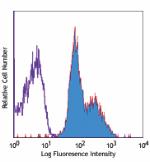
Human peripheral blood lymphocytes stained with TS2/16 APC -
PE anti-human CD29
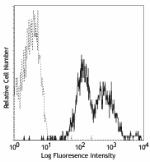
Human peripheral blood lymphocytes stained with TS2/16 PE -
PE/Cyanine5 anti-human CD29
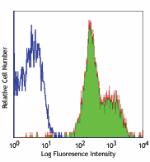
Human peripheral blood lymphocytes stained with TS2/16 PE/Cy... -
Purified anti-human CD29
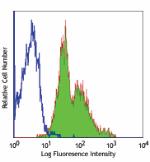
Human peripheral blood lymphocytes stained with purified TS2... 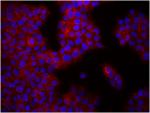
BT474 breast cancer cells were stained with anti-CD29 (clone... -
APC/Cyanine7 anti-human CD29
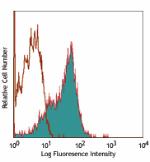
Human peripheral blood lymphocytes stained with TS2/16 APC/C... -
Alexa Fluor® 488 anti-human CD29
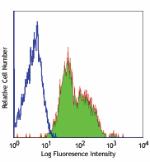
Human peripheral blood lymphocytes stained with TS2/16 Alexa... -
Alexa Fluor® 647 anti-human CD29
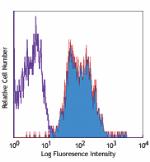
Human peripheral blood lymphocytes stained with TS2/16 Alexa... -
Alexa Fluor® 700 anti-human CD29
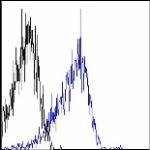
Human peripheral blood lymphocytes stained with TS2/16 Alexa... -
Purified anti-human CD29 (Maxpar® Ready)
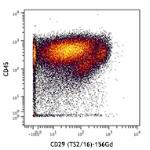
Human PBMCs stained with 154Sm-anti-CD45 (HI30) and 156Gd-an... -
PerCP/Cyanine5.5 anti-human CD29
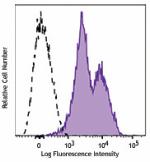
Human peripheral blood lymphocytes stained with CD29 (clone ... -
PE/Cyanine7 anti-human CD29
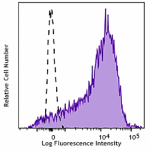
Human peripheral blood lymphocytes stained with CD29 (clone ... -
TotalSeq™-A0369 anti-human CD29
-
TotalSeq™-C0369 anti-human CD29
-
TotalSeq™-B0369 anti-human CD29
-
PE/Dazzle™ 594 anti-human CD29

Human peripheral blood lymphocytes stained with CD3 APC and ... -
Ultra-LEAF™ Purified anti-human CD29
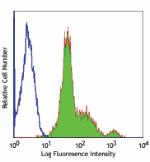
Human peripheral blood lymphocytes stained with Ultra-LEAF™ ... -
TotalSeq™-D0369 anti-human CD29

 Login / Register
Login / Register 


















Follow Us